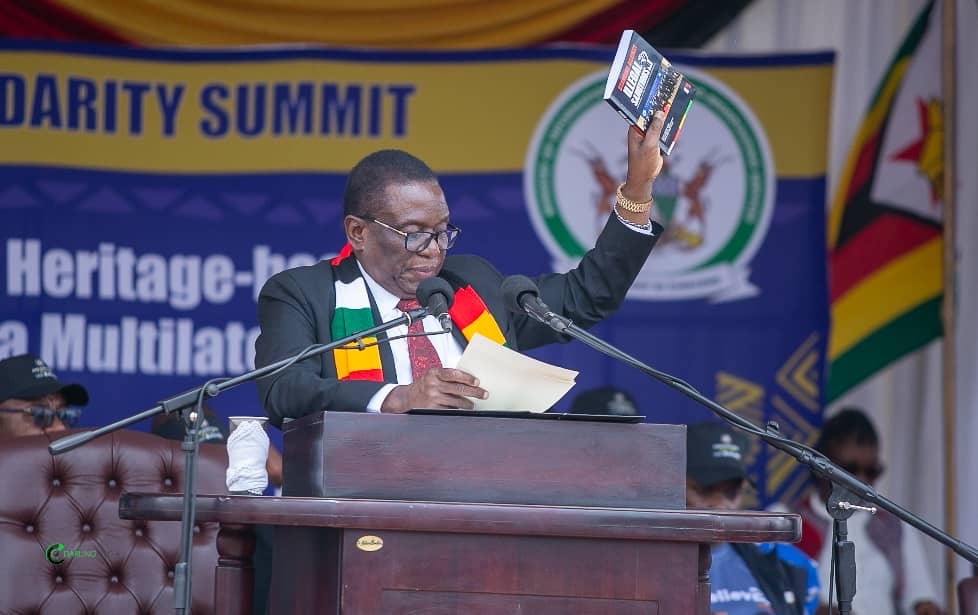President Launches Groundbreaking Book on Zim’s Fight Against Illegal Sanctions
5 min read
President Emmerson Dambudzo Mnangagwa has officially unveiled a seminal publication titled “Standing Against Illegal Sanctions: Resistance, Policy Innovations and Advocacy,” a comprehensive volume which he described as “meticulously researched and a testament to Zimbabwe’s unyielding spirit.”
The book, launched during a high-level event attended by government officials, academics, diplomats, liberation war veterans and policy experts, documents Zimbabwe’s historical journey under the burden of Western-imposed sanctions, while highlighting the nation’s resilience and policy responses over the past two decades.
In his keynote address at the launch, President Mnangagwa said the book “captures the lived reality of a nation placed under unjustified and illegal coercive measures,” emphasizing that the intention behind the publication is not merely academic but strategic—serving as a resource for advocacy and historical record.
“These sanctions were not only an attack on our economy,” he said, “but a direct assault on the sovereignty and dignity of Zimbabwe as an independent nation.
Yet through innovation, unity of purpose and strategic partnerships, we have continued to move forward.
This volume documents that journey, our breakthroughs, our determination and our belief in a just world order.”
The book provides a multidimensional analysis of sanctions, covering economic impacts, diplomatic dynamics, security implications, and the psychological warfare waged against Zimbabwe through global media narratives.
The book assembles contributions from historians, economists, political analysts, legal experts and Pan-African scholars.
President Mnangagwa praised the authors for capturing voices seldom heard in Western academic or policy circles.
Zimbabwe has been under sanctions from the United States, the United Kingdom and the European Union since 2001, following the implementation of the Fast Track Land Reform Programme aimed at correcting colonial land ownership imbalances.
Western nations argue the sanctions target specific individuals and companies, yet evidence has shown that the measures have crippled key sectors of the economy, limited access to international credit, and stalled development.
The book exposes what it calls “the hypocrisy and weaponisation of economic measures to achieve regime change agendas under the guise of promoting democracy.” It also lays bare the role of what it terms “colonial economic hegemony,” arguing that sanctions are part of a broader strategy to punish African nations that assert sovereignty over their national resources.
Far from a narrative of victimhood, the publication showcases Zimbabwe’s responses as a story of resilience and creativity.
It details policy innovations such as import substitution industrialisation, re-engagement diplomacy, local value chain development, food security reforms, and the use of alternative financial frameworks in trade to bypass sanction-induced limitations.
The adoption of the Education 5.0 model, which emphasises innovation and industrial application of learning, is also featured prominently as a home-grown developmental policy born out of necessity.
In one chapter, the book analyses the Zimbabwe National Development Strategy 1 (NDS1) as a strategic economic recovery blueprint designed to strengthen productivity under hostile international conditions. It credits the agricultural transformation—especially under the Pfumvudza/Intwasa climate-smart farming programme—as a success story that has restored food self-sufficiency despite financial blockades.
His Excellency the President Dr. Mnangagwa stressed that the book is not just for academic reference but also for diplomatic use.
It provides evidence-based analysis that can be tabled in international forums to counter the dominant Western narrative. It highlights cases of similar sanctions imposed on Cuba, Venezuela, Iran and Russia, linking Zimbabwe’s situation to a broader pattern of unilateral coercive measures used to control global geopolitics.
“Through this book, we are telling our story in our own voice,” said President Mnangagwa.
“For too long, others have spoken for Zimbabwe, misrepresented Zimbabwe and judged Zimbabwe. This publication is a bold intellectual rebuttal to falsehoods and propaganda.” The President added.
The launch comes at a time when the Southern African Development Community (SADC) has intensified its call for the immediate lifting of sanctions on Zimbabwe.
Every year on October 25th, SADC member states commemorate Anti-Sanctions Solidarity Day, affirming collective regional resistance to economic aggression.
The foreword of the book references SADC’s official position, stating: “Sanctions on Zimbabwe are sanctions on the region. They undermine regional industrialisation, trade and economic integration. Zimbabwe is a vital artery in Southern African logistics, agriculture and mining. Its economic strangulation is therefore a direct attack on SADC.”
African Union (AU) representatives also welcomed the book as a “timely intellectual contribution to Africa’s policy independence.”
Among the most compelling sections of the publication is a chapter dedicated to the social consequences of sanctions—what the authors call “collective punishment.”
It details how restrictions on health care imports affected hospitals, how farmers lost access to markets, how students struggled with limited access to global education funding, and how millions of ordinary people were denied opportunities because of blocked financial transactions.
The chapter cites United Nations Special Rapporteur Alena Douhan, who after visiting Zimbabwe in 2021 concluded that sanctions “exacerbate pre-existing economic and humanitarian challenges and violate international law.”
The book also celebrates advocacy movements resisting sanctions. It documents Pan-African campaigns led by civil society, youth groups and diaspora organisations demanding economic justice for Zimbabwe.
It highlights how global solidarity is growing as more nations challenge the legality of unilateral sanctions outside the framework of the United Nations Security Council.
Zimbabwe’s diplomats have intensified engagements on the issue, and the Ministry of Foreign Affairs has welcomed the publication as a weapon in the ongoing international legal and diplomatic battle.
Scholars have praised the publication as a significant addition to Africa’s decolonial literature.
The book can aptly be interpreted as a documentation of a nation that has refused to surrender its history or be recolonised through economic warfare.
Several universities have already expressed interest in adopting the book as recommended reading for courses in international relations, African studies, development policy and economic diplomacy.
The book is also expected to be integrated into the curriculum across levels on national resilience and strategic security.
In closing his address, President Mnangagwa urged citizens, academics and youth to use knowledge production as a tool of resistance, saying, “Every generation has a mission. Ours is to defend our sovereignty with both intellect and action. Let us continue building our nation brick by brick, stone upon stone—no matter the sanctions.”
The publication was received with applause, and thousands of copies will be distributed across government institutions, universities, embassies and public libraries.
A digital version will also be made available to facilitate global access.
“Standing Against Illegal Sanctions: Resistance, Policy Innovations and Advocacy” is more than a book—it is a mirror of Zimbabwe’s journey through hardship, a summary of its tactical responses and a declaration of defiance in the face of economic neo-colonialism.
It challenges the world to reconsider the ethics of weaponising economics and ignites a broader African conversation on sovereignty, justice and development.
As Zimbabwe continues its re-engagement and economic reform agenda, this publication is set to shape debate, inspire policy and strengthen international solidarity.
Above all, it stands as a reminder that a nation determined to write its own destiny cannot be defeated by sanctions.




